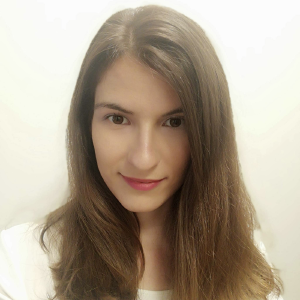You are here :
SIF 3rd Cohort Fellows - Katarina Karlova, CY Cergy Paris University

Researcher Summary
My research focuses on frustrated quantum magnetism, specifically on the interplay between geometric frustration, quantum fluctuations, and emergent collective phenomena in low-dimensional spin systems. During my EUTOPIA-SIF fellowship, I investigated spin-1/2 Heisenberg antiferromagnets on geometrically decorated lattices — the square and honeycomb versions of diamond-decorated networks.
One of the central outcomes of my fellowship was the identification of a macroscopically degenerate dimer–tetramer phase in both lattice geometries, where local frustration leads to exotic low-energy behavior. In the square-lattice system, we explored its thermodynamic properties under magnetic fields and uncovered a robust magnetocaloric effect, highlighting its potential relevance for low-temperature cooling applications (Phys. Rev. B 110, 214429).
In the honeycomb-lattice system, we discovered striking thermodynamic signatures of the Kasteleyn transition, an asymmetric crossover associated with string excitations and singularities in the specific heat. We demonstrated that the quantum model can be effectively mapped to a classical hard-dimer model with tunable monomer density, opening a pathway to realizing emergent Kasteleyn physics in quantum magnets. This work forms the basis of a forthcoming joint publication.
My approach combines exact diagonalization, finite-temperature Lanczos methods, quantum Monte Carlo simulations, and analytical mapping to effective models. A key element of the fellowship was fruitful collaboration with researchers across multiple institutions, including CY Cergy Paris Université, RWTH Aachen, EPFL Lausanne, and P. J. Šafárik University.
In the future, I aim to build on these insights to better understand constrained dynamics and topological features in quantum spin systems. I also intend to help strengthen the research environment in Slovakia by fostering collaborative research and mentoring young scientists, particularly in the field of quantum magnetism.
Curriculum Vitae
- Education
August 2019: PhD in Theoretical Physics, Pavol Jozef Šafárik University in Košice, Slovakia
June 2015: Master’s Degree of Academic Subject Teaching of Mathematics and Physics, Pavol Jozef Šafárik University in Košice, Slovakia
- Experience
September 2019 - August 2023: Postdoctoral researcher, Pavol Jozef Šafárik University in Košice, Slovakia
- Publications/Research achievements
Selection of the 5 most important publications from the last 4 years:
- K. Karľová, J. Strečka, T. Verkholyak, Physical Review B 100, 094405 (2019).
- K. Karľová, J. Strečka, M. L. Lyra, Phys. Rev. E 100, 042127 (2019).
- K. Karľová, J. Strečka, J. Richter, Phys. Rev. E 106, 014107 (2022).
- N. Caci, K. Karľová, T. Verkholyak, J. Strečka, S. Wessel, A. Honecker, Phys. Rev. B 107, 115143 (2023).
- J. Strečka, K. Karl’ová, T. Verkholyak, N. Caci, S. Wessel, A. Honecker, Phys. Rev. B 107, 134402 (2023).
Research Project:
Theoretical Modeling of Advanced Quantum Materials
The project deals with unconventional quantum properties of frustrated Heisenberg spin systems, which are inspired by an intriguing class of novel quantum materials. The theoretical modeling of frustrated quantum materials will exploit the state-of-the-art analytical and numerical methods including among other matters the rigorous mapping transformations, the full exact diagonalization and the finite-temperature Lanczos method. The first part of the project is devoted to an investigation of a robustness of the quantum entanglement of the mixed-spin Heisenberg extended delta chain against rising temperature and magnetic field as indispensable requirement for quantum computing and processing of information. The model is inspired by the quantum spin-chain material [{CuIIMnIIL}{(µ-NC)3WV(bipy)(CN)3}]+, whereby our aim is to provide clarification of its static and dynamic properties along with theoretical interpretation of available magnetic data. In the second part of the project we will characterize in detail long-range entanglement of paradigmatic frustrated Heisenberg spin system with a quantum spin-liquid ground state, which provides promising platform for quantum computation and quantum information processing. This latter stage will be done in close collaboration with the experimental groups searching for quantum spin-liquid materials.


